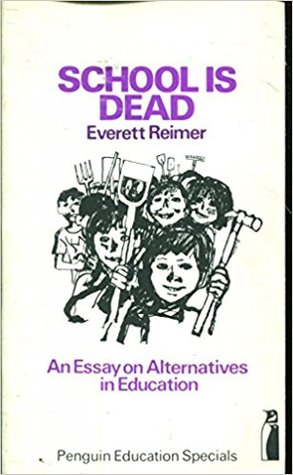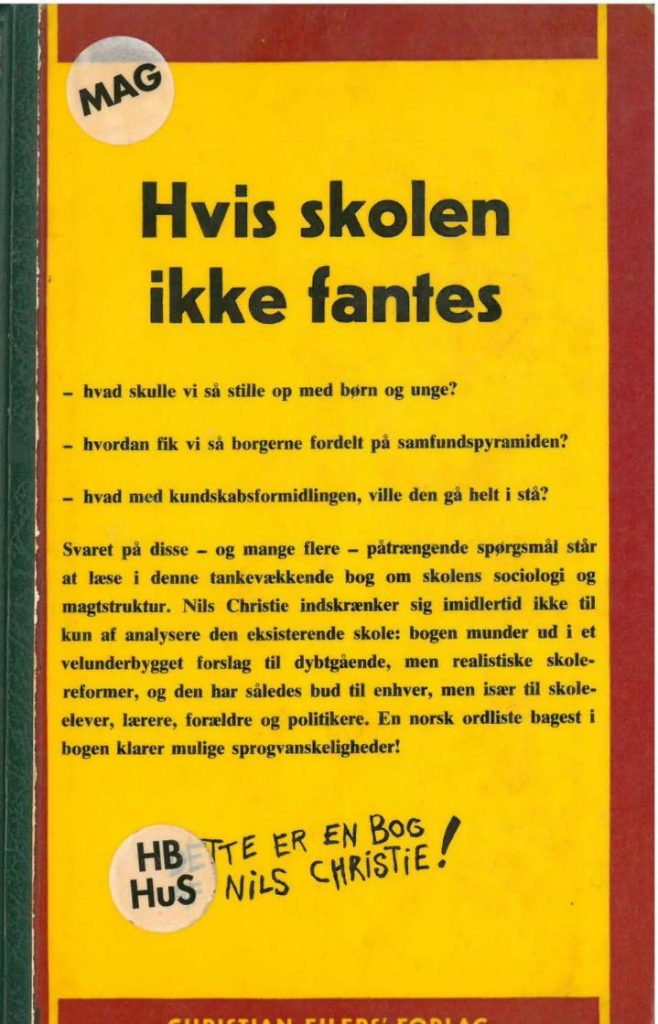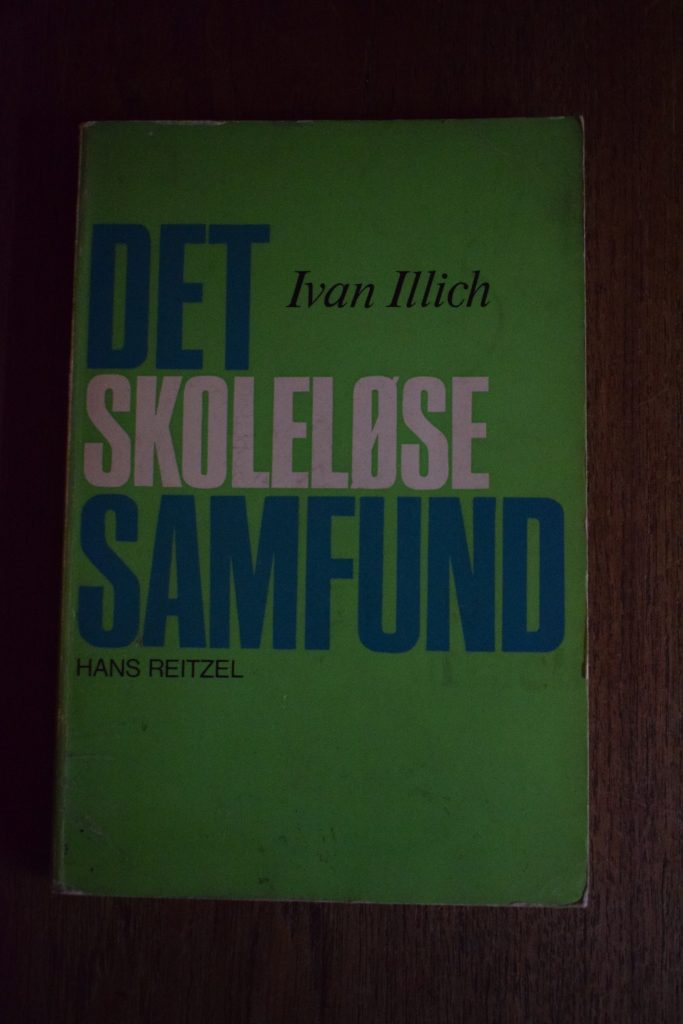Now I have finished the last book that the Danish politician Bertel Haarder recommended me to read, when we interviewed him last year about homeschooling (https://homeschool.dk/interview-med-bertel-haarder-om-hjemmeundervisning/) and will make my comments on it in this post. To make a summary, the books recommended were:
- School is Dead, Everett Reimer, 1971.
You can read my thoughts on this book here: https://homeschool.dk/school-is-dead-alternatives-in-education-by-everett-reimer/

2. Hvis Skolen Ikke Fantes, Nils Christie, 1971.
This book can be found online in a free text version here: https://archive.org/stream/Christie1971HvisSkolenIkkeFantes/Christie%20%281971%29%20Hvis%20skolen%20ikke%20fantes_djvu.txt
This book was the least catchy of the three. Maybe because I could only get hold of it in Norwegian. It was hard to read.
It reflected on the change of living from craftsmanships and in small communities, to a massproducing society, where most of the population live in large cities.
It gave examples of how this has effected family life and motivation for learning. Moving from learning by doing, to learning in theory.

3. Deschooling Society, Ivan Illich, 1971.
This was my christmas present this year 🙂 I was so happy and have really enjoyed it. The author is a friend of Everett Reimer, who wrote “School is dead” and they agreed on many things regarding learning. They met in South America, where Ivan Illich worked as a vice rector of the Catholic University of Puerto Rico.
The book “Deschooling Society” is a critique of compulsory mass education. Ivan Illich argued that the oppressive structure of the school system, could not be reformed, but had to be dismantled in order to free humanity, from the crippling effects of lifelong institutionalization.
The book is more than a critique—it contains suggestions for a reinvention of learning throughout society and lifetime. Particularly striking is his call (in 1971) for the use of advanced technology to support “learning webs”.
While Illich never referred to himself as an anarchist in print, he was closely associated with major figures in left-anarchist circles, notably Paul Goodman and unschooling advocate John Holt.
If he had lived today, with the opportunities the internet gives us to find knowledge and peers, he would have been very disappointed, with how little the school systems around the world has changed.
He argues that institutionalization of values leads to a society with physical pollution, greater social equality and psychological impotence. How non-material needs is transformed into demands for consumer goods. When health, education, individual movement, welfare or psychological cure is defined as a result of public benefits or “treatments”.
School has become a religion. It is never questioned about it’s existence, and the acceptance of self-taught learning is very low. Expenses paid in most of the world to school education is growing, and when it isn’t working, more money is set in. We should concentrate on focused and self-motivated learning. The inequality between rich and poor is disproportionate, in how much schooling they receive from the state. And so many resources is wasted on pupils, that lack motivation.
If we could all have a kind of “resource bank” from where you could go when you were ready to learn something. Then everybody could have the access to a certain amount of learning. It could be learning from a person that had certain language skill, a neighbor in your area (Illich also talks about the move away from having local networks) or bringing a group of like minded people together, focused on a special area of learning.
This book seems like a follow up to “School is dead”. Where “School is dead” doesn’t really give any suggestions to other ways of organizing learning worldwide, but describes and talks about the faults of our present systems of learning, “Deschooling society” actually gives a number of ideas to how we could learn in a more constructive way.
We live in a society that believes in mass production, as if it were a religion, and that you can streamline values. That people only can learn in a specific environment and be judged as if they were all alike. We are fooled into believing that we are all given the same opportunities in life, and that it is our own fault, if we don’t succeed. So we learn our place in society and accept the situation. School has become so accepted, as a part of life that we happily hand over our precious children, to be institutionalized and brainwashed when they turn 1 year old, at the latest, because we believe “it is the best for them”. We no longer feel able to bring up our own children. We are not properly qualified. Do not have the right diplomas and schooling.
In an ideal world, I don’t believe there is another way, than our current learning system, that is the right one, but the answer is that there are many right ways of learning. That there should be the freedom to choose different ways to learn. To take responsibility of your own life and your childrens learning, by not blindly accepting the schooling way, but bringing up many alternatives to learn. It would give a much broader knowledge base in the population.
Read the books if you are interested. I found them very challenging and inspiring.

